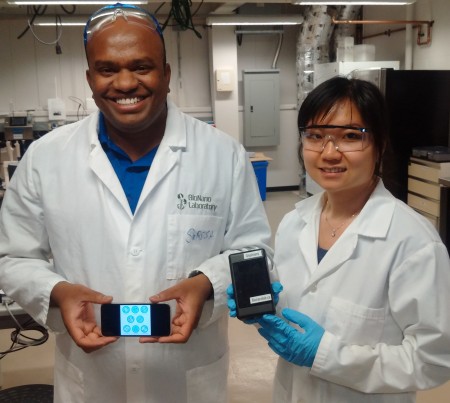Big idea, small package. Nanotechnology detects food allergens
New allergen detector from the University of Guelph could help save lives
The Record Newspaper Magazine News (link)
CTV Kitchener TV Interview (link) (Video File download)

Photo Credit: University of Guelph - June 29, 2016
You can’t buy one yet, but University of Guelph researchers have come up with a device that can tell you if potentially dangerous food allergens are in the food you’re about to eat.
The tool, developed by researchers at the U of G’s BioNano Laboratory, is a portable apparatus that can identify allergens such as peanuts or gluten. The new wallet-sized detector allows for on-location testing and could expedite allergen reporting and reduce the number of allergic reactions through more timely results, a news release said.
The process requires a small amount of the suspected food to be liquefied in a suspension. A filter syringe is then used to inject it into a silicon-based plate developed by the researchers.
“As the sample passes through tiny tubes of the microfluidic chip, it travels through a beam of light from a LED source that is monitored by a specialized camera,” BioNano Lab director Suresh Neethirajan said in the release.
“The allergen glows and the camera is able to decipher a result in just 10 minutes. We also are developing a new app that will allow us to have results almost immediately. Typically, it would take two to three days to hear from a lab, but now, we should be able to know for certain in two to three minutes.”
In addition, since the technology uses microfluidics and nano-equipment, it requires a very small sample, the release said.
“We’re bringing down the volume of the reagents involved, making this a more environmentally friendly way of testing allergens,” BioNano research engineer Xuan Weng said in the release.
With one in 10 people in the world suffering from a food allergy, the researchers see a market for the device, for which they have already filed a patent, though it will not be available on the market for a couple of years.
“This device could be used by manufacturers, food safety inspectors, restaurant owners and servers, customers, or any one concerned about food safety,” said Neethirajan.
“We’re also working on making the device capable of detecting other allergens, such as shellfish. What we’re doing is going from being reactive with allergies to actually preventing them. This device could transform the future of identifying hazardous food components.
